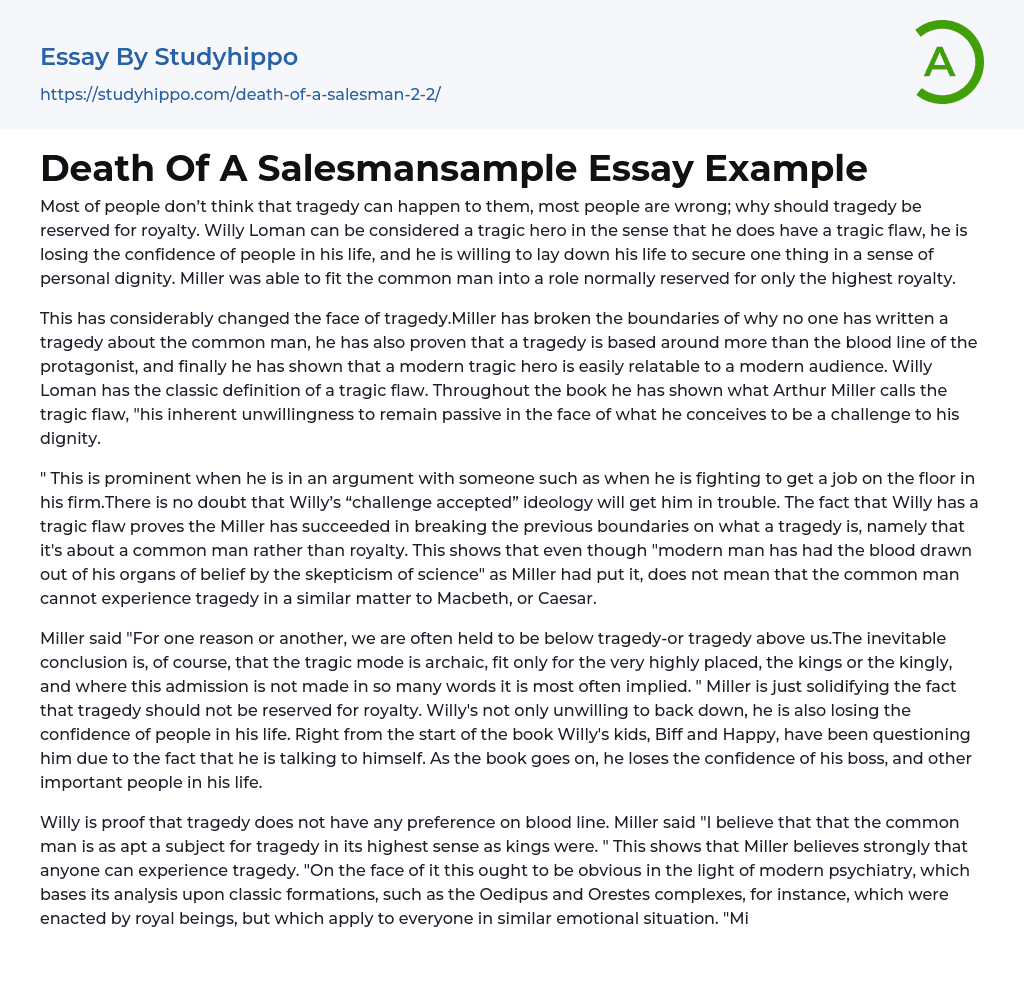The majority of individuals believe that tragedy is unlikely to happen to them. However, this assumption is generally inaccurate because tragedy can affect anyone, regardless of their status. Willy Loman exemplifies a tragic hero due to his tragic flaw of losing the trust of those around him and his willingness to sacrifice himself for the sake of his personal dignity. Miller effectively incorporated the common man into a role typically reserved only for royalty.
The genre of tragedy has been transformed by Arthur Miller's work. He challenged the notion that tragedies can only be about noble characters and demonstrated that the tragedy of the common man is equally valid. Furthermore, he expanded the definition of a tragic hero beyond lineage and proved that modern audiences can relate to them. Miller's protagonist, Willy Loman,
...embodies the traditional tragic flaw, described by Miller as "his inherent unwillingness to remain passive in the face of what he conceives to be a challenge to his dignity."
Despite the skepticism of modern science which has drained the beliefs of the common man, Arthur Miller's play demonstrates that tragedies can happen to common people, not just royalty. This is evident when Willy fights to get a job on the floor in his firm, and his "challenge accepted" mentality is bound to lead him into trouble due to his tragic flaw. Miller's success in breaking previous boundaries on what a tragedy is, is proven by Willy's flawed character.
Miller argues that the tragic mode is often seen as archaic and reserved only for royalty, which implies that tragedy should not be exclusive to those of high position. This notion is reinforced in th
story of Willy, who not only refuses to surrender but also loses people's trust. Willy's sons, Biff and Happy, are already doubtful of him from the start because of his habit of talking to himself. As the story progresses, Willy's boss and other significant individuals in his life lose faith in him.
According to Miller, Willy serves as evidence that tragedy can affect anyone regardless of their lineage. Miller believed that the "common man" is just as capable of experiencing tragedy as those of royal blood. He points out that this should be clear based on modern psychiatry's use of classic forms such as the Oedipus and Orestes complexes. Although these were enacted by royals, they apply to anyone who finds themselves in similar emotional situations. Miller emphasizes this point further in his writings.
Miller argues that modern psychiatry must provide clear evidence that tragedy can strike anyone. Willy's readiness to die for the sake of his personal dignity and pursuit of the American Dream is the ultimate downfall of the tragic hero. Willy's flashbacks reveal that he has been pursuing the American Dream from the outset, despite the financial difficulties it has caused him. He remains fixated on the idea of having a conventional family, despite knowing he cannot attain it.
With an abundance of bills and no legitimate source of income, coupled with infidelity, Willy's descent into madness makes him a relatable figure in contemporary times. According to Miller, most individuals are flawless in their acceptance of their circumstances. However, some go against the grain and rebel against their degrading situation. These rebellious souls resonate with the play. Willy's tragic flaw – his loss of confidence
from important people and unwavering commitment to his dream – ultimately leads to his demise, thereby cementing his status as a tragic hero. Arthur Miller has revolutionized the tragic genre with this portrayal.
Arthur Miller has expanded the limits of contemporary tragedy, disproving the significance of lineage and rendering it relevant to present-day spectators.
- Age Of Enlightenment essays
- Ethos essays
- Time essays
- Acceptance essays
- Meaning Of Life essays
- Reality essays
- Natural Law essays
- Political Philosophy essays
- Utilitarianism essays
- Existence essays
- Free Will essays
- Good And Evil essays
- Confucianism essays
- Relativism essays
- Conscience essays
- Environmentalism essays
- Empiricism essays
- Epistemology essays
- Ethics essays
- Existentialism essays
- Human Nature essays
- Individualism essays
- Metaphysics essays
- Philosophy Of Life essays
- Transcendentalism essays
- Truth essays
- Destiny essays
- Determinism essays
- Fate essays
- Functionalism essays
- Philosophers essays
- Pragmatism essays
- Future essays
- Child Observation essays
- Critical Reflection essays
- Teaching Philosophy essays
- Personal Philosophy essays
- Action Speak Louder Than Words essays
- Can Money Buy Happiness essays
- Values of Life essays
- Ethical dilemma essays
- Normative Ethics essays
- Virtue Ethics essays
- Belief essays
- Deontology essays
- Moral essays
- Virtue essays
- Work Ethic essays
- Henry David Thoreau essays
- Carl Jung essays




